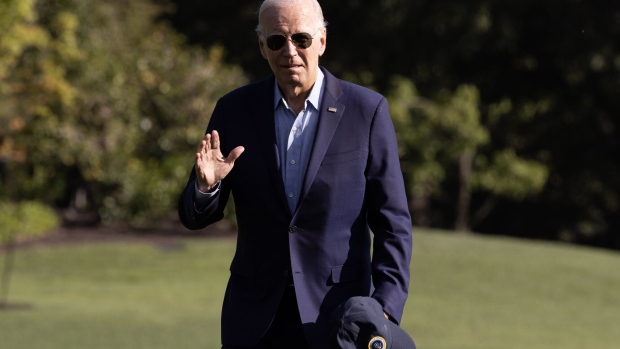Sep 4, 2023
Biden’s Asean Snub Prompts Soul-Searching Over Bloc’s Relevance
, Bloomberg News

(Bloomberg) -- When Southeast Asia’s annual summit was expanded to include the US more than a decade ago, it assured an often neglected region a regular audience with the sitting president. Not this year.
Joe Biden will skip the summit hosted by the Association of Southeast Asian Nations in Jakarta starting Tuesday, prompting former top diplomats in the region to question the bloc’s diminishing influence and its neutral strategy. Biden is sending Vice President Kamala Harris to Asean just before he attends the Group of 20 Nations gathering in India. He then heads to Vietnam, which is a short flight to Jakarta.
The soon to be 11-nation Asean bloc has for years refrained from choosing between its biggest security partner in the US, and its most important economic one in China. Instead, it embraced a collective non-alignment, creating a rare, safe space for geopolitical foes to come together.
While that strategy may have served its interests in the past, the growing rivalry between the US and China is showing the risks that comes with sitting on the fence. Beijing is pressing ahead with its claim to nearly all of the South China Sea while the US is reshaping regional alliances in a bid to build a collective security network that China says is designed to contain its rise.
Nations caught in the middle, like the Philippines and Vietnam, are stepping up their engagement with the US and its allies.
“They haven’t adapted fast enough to the rapidly evolving strategic environment,” said Bilahari Kausikan, Singapore’s former permanent secretary for foreign affairs said of Asean. “You’re not going to become central by sitting around twiddling your thumbs and repeating yourself.”
Biden is scheduled to visit Hanoi on Sunday where the two sides are poised to significantly enhance ties. China is meanwhile planning to send Li Qiang to Jakarta where he will make his international debut as premier.
Biden’s absence in Asean this year is more disappointing to the region than when Donald Trump made a habit of skipping those summits. This time, however, former diplomats are saying the blame lies with the bloc itself.
“This is a manifestation of the gradual sense of drift and the increasing question mark about Asean’s relevance,” said former Indonesian Foreign Minister Marty Natalegawa. “Asean has allowed these meetings to become so robotic and so procedural — almost disconnected from the wider basic dynamics of our region.”
Unlike the North Atlantic Treaty Organization, Asean members are not bound by a commitment to go to war in the event of an attack against one of its members. And while Southeast Asia’s foreign policy is geared toward avoiding becoming a geopolitical battleground, conflicting interests have stood in the way of having a strong consensus on longstanding threats.
In no place is that more apparent than the oil and gas rich South China Sea, where regular incursions by Chinese vessels have forced the Philippines and Vietnam to bolster their own claims. Just last week, the two joined India in their opposition to a new Chinese map.
Yet as a group, Asean has refrained from calling out China when times are tense. A code of conduct with Beijing meant to establish the rules of maritime engagement has shown no progress after two decades of negotiations. Observers also lament the lack of follow through to an ambitious but opaque regional outlook introduced in 2019.
Divisions within Asean also extend to the worsening violence in Myanmar as factions led by Indonesia and Thailand differ over how to engage the junta.
The US has meanwhile strengthened its hand in the broader Indo-Pacific region. Biden last month facilitated a diplomatic breakthrough between Japan and South Korea after years of icy ties. It also signed a new agreement with Palau, giving it the authorization to unilaterally enforce maritime regulation in the tiny Pacific island.
“It’s just impossible to look at the record that this administration has put forward and say that we are somehow walking away,” White House National Security Council spokesman John Kirby said last week in response to criticism over Biden taking a miss in Jakarta.
There are other considerations for Biden. The Asean Summit kicks off just as the US marks Labor Day — an especially critical time for Biden to appeal to blue-collar workers on American soil and woo key voters for his 2024 re-election campaign.
For Indonesia as this year’s Asean rotating chair, the snub dents the success of what President Joko Widodo had described as growing international trust in his country after playing host to a meeting between Biden and Xi at the G-20 last year. And with others pointing to the fact Jakarta has had four different ambassadors to Washington since the start of 2019 while keeping its strategic non-alignment, its time under the world’s spotlight is looking short-lived.
“I’m wondering to what extent Indonesia carries sufficient heft and weight in the corridors of power in Washington in not being able to convince the president of the United States to turn up at what is arguably the region’s most important gathering,” said Natalegawa, the former foreign minister. “This is a wake up call for Jakarta, that more of the same may not be good enough.”
Addressing delegates on Tuesday, the leader known as Jokowi said that Asean must not become a proxy for any power even as he acknowledged the need for a lasting vision.
“Asean needs a long-term and relevant tactical strategy in accordance with the expectations of the people, which is not only for the next five years, but the next 20 years until 2045,” Jokowi said.
--With assistance from Ben Westcott, Isabel Reynolds, Faris Mokhtar, Chandra Asmara, Michelle Jamrisko and Norman Harsono.
(Updates with Indonesia president’s remarks in the last two paragraphs.)
©2023 Bloomberg L.P.








